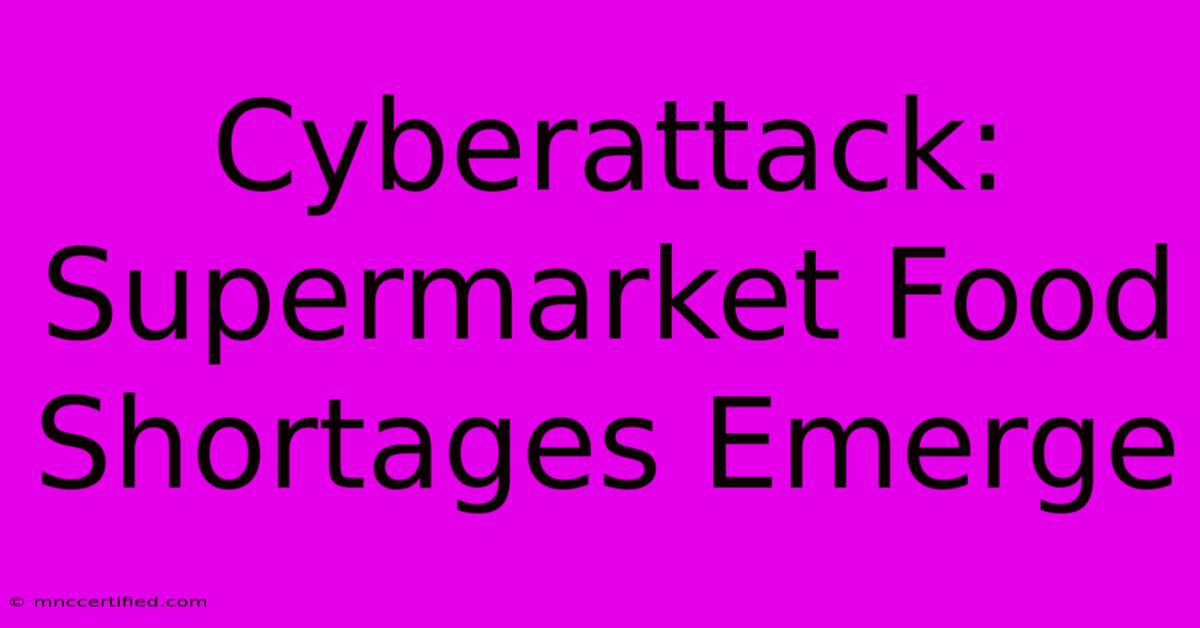Cyberattack: Supermarket Food Shortages Emerge

Table of Contents
Cyberattack: Supermarket Food Shortages Emerge – A Growing Threat to Global Food Security
The modern supermarket, a symbol of readily available food, is increasingly vulnerable. Recent cyberattacks targeting major food retailers and their supply chains have exposed a chilling reality: our food security is directly threatened by digital warfare. These attacks aren't just about stolen data; they're leading to real-world consequences, including supermarket food shortages and escalating prices. This article delves into the growing threat of cyberattacks on the food industry and their devastating impact.
The Ripple Effect of a Cyberattack on Food Supply
A cyberattack on a supermarket or a key player in its supply chain can have a devastating domino effect. Consider these scenarios:
-
Disrupted Supply Chains: Attacks targeting transportation companies, logistics providers, or even agricultural technology firms can disrupt the entire flow of goods. This leads to delays, spoilage, and ultimately, empty shelves in supermarkets. The recent ransomware attack on [insert example of a real-world incident, citing a credible news source] illustrates this perfectly.
-
Production Halted: Food processing plants rely heavily on automated systems. A successful cyberattack can bring production lines to a standstill, drastically reducing the supply of certain products. This can particularly impact perishable goods, leading to rapid shortages and increased prices.
-
Point-of-Sale System Downtime: Attacks targeting supermarket POS (point-of-sale) systems can lead to complete store closures or severely limit operational capacity. This directly impacts customer access to food and creates significant logistical headaches.
-
Data Breaches and Consumer Trust: Beyond the immediate disruption, cyberattacks often result in data breaches, exposing sensitive customer information. This erodes consumer trust and can have long-term impacts on the affected supermarket's reputation.
Vulnerable Targets: Who's at Risk?
The food industry, with its complex and interconnected supply chains, is a prime target for cybercriminals. Several key players are particularly vulnerable:
-
Supermarkets and Grocery Chains: Large retailers with extensive IT infrastructure are attractive targets due to the potential for large ransoms and the disruption they can cause.
-
Food Processors and Manufacturers: Disrupting food production can have a significant economic impact, making these businesses lucrative targets for cyberattacks.
-
Agricultural Technology Companies: The increasing reliance on technology in agriculture makes these companies vulnerable to attacks that can affect crop yields and livestock management.
-
Transportation and Logistics Providers: Disrupting the movement of food products can cause widespread shortages and price increases, making these companies attractive targets.
Mitigating the Risk: Strengthening Food Security in the Digital Age
Combating the threat of cyberattacks on the food industry requires a multi-pronged approach:
-
Investing in Cybersecurity Infrastructure: Supermarkets and other food industry players must invest in robust cybersecurity measures, including strong firewalls, intrusion detection systems, and regular security audits.
-
Employee Training and Awareness: Educating employees about phishing scams, malware, and other cyber threats is crucial to prevent human error from becoming a vulnerability.
-
Supply Chain Resilience: Building more resilient and diversified supply chains can help mitigate the impact of localized disruptions caused by cyberattacks.
-
Government Regulation and Collaboration: Increased government regulation and collaboration between industry players and cybersecurity experts are essential to improve the overall security posture of the food industry.
-
Incident Response Planning: Developing and regularly testing incident response plans is crucial to minimize the impact of a successful cyberattack.
The Future of Food Security: A Call to Action
The threat of cyberattacks to our food supply is real and growing. Addressing this challenge requires a concerted effort from governments, industry players, and consumers alike. Failure to act will only lead to more frequent and severe food shortages, escalating prices, and a compromised food system. We need a proactive and collaborative approach to ensure the security and resilience of our global food supply in the digital age. This means prioritizing cybersecurity investments, fostering collaboration, and promoting a culture of awareness and preparedness across the entire food industry. Only then can we truly safeguard our collective food security.

Thank you for visiting our website wich cover about Cyberattack: Supermarket Food Shortages Emerge. We hope the information provided has been useful to you. Feel free to contact us if you have any questions or need further assistance. See you next time and dont miss to bookmark.
Featured Posts
-
Injury Blow Barcelonas Brest Test
Nov 27, 2024
-
Sporting Cp Star Misses Arsenal Clash
Nov 27, 2024
-
Walmarts Dei Update Furners Assurance
Nov 27, 2024
-
Finding Eloise Sisley Beda In Cortland Ohio
Nov 27, 2024
-
Capital Womens Care Insurance
Nov 27, 2024